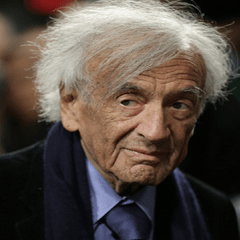
Remembering Elie Wiesel Through His Love of Music
As we remember Elie Wiesel – memorializing one of our century’s greatest Jewish thinkers and humanitarians whom President Obama called “the conscience of the world” – we pay tribute to one of the most prominent Holocaust survivors whose message of “never forget” goes beyond the Jewish community alone.
Instead, this Nobel Peace laureate who mingled with dignitaries, world and religious leaders and the rest of us, tirelessly reminded us of our moral obligation to fight bigotry, oppression and inhumanity in any form.
There is no question that Wiesel’s legacy continues through his dozens of books, many of which have become classics that have sold millions of copies and have been translated in over 30 languages – like The Night Trilogy that is part of the curriculum for many junior high and high school students across the country.
But there is another legacy that Elie Wiesel leaves behind: his love of music.
As he once told a reporter, “Music is my life. When I write I need music, and a very special kind. It must not be symphonic because I cannot concentrate with symphonic music, but chamber music or choral music, requiems, which are my favorite musical compositions.”
As an occasional soloist and special guest conductor and friend to cantors and Jewish musicians alike, he was known to have shared personal stories, niggunim and Hasidic songs from his childhood home of Sighet that have been dispersed through Jewish communities across the country.
“I hope you do not expect a late life career change,” he joked to the audience at the 92nd Street Y in a 2010 concert in his honor called, “Elie Wiesel: Memories and Melodies of my Childhood” in which he performed a searing rendition of Ani Maa’mim. (One Ani Maa’min melody has been attributed to a Modzitzer Hasid who allegedly sang the tune while in a cattle car headed to Treblinka.)
In fact, Wiesel often started his talks – whether to school children or to auditoriums of people – not with words but with a niggun. These distinctly Eastern European melodies, harkening back to his childhood, never failed to transform an audience into a community of inter-connected people. For what began quietly, inevitably built in momentum, linking us to each other and to our past.
Music, after all, transcends so much. During the Holocaust, the concerts, operas and theater performed in the very machinery of death offered nothing less than spiritual nourishment.
Today, music continues to be a source of sustenance for our Jewish souls.
The American Conference of Cantors (ACC) understands deeply the connection between music and memory. Originally founded in 1953 in the ashes of the Holocaust, it is now an organization of over 500 ordained and certified cantors affiliated with the Reform movement.
Beyond just the Reform movement, however, the ACC is devoted to bringing Jewish music into all of our lives. A good example of this is the recent acquisition by the ACC of Transcontinental Music Publications (TMP), the largest distributor of Jewish sheet music in the world. Established in 1938, TMP’s collection includes sheet music and songbooks by renowned Jewish composers – including a few versions of Ani Ma’main.
And as cantors working in a variety of capacities, we will continue to honor Elie Wiesel’s legacy. From the bimah to the classroom, we will continue to honor Elie Wiesel’s memory with a deep appreciation for music that at once links us to the past, inspires us in the present and serves as the soundtrack that guides us toward the future – "we will never forget."
Cantor Steven Weiss, the Cantor and Director of Education at Congregation Sha’aray Shalom in Hingham, Massachusetts, is President of the American Conference of Cantors (ACC).
To see the collection of Jewish sheet music, please visit: www.transcontinentalmusic.com

